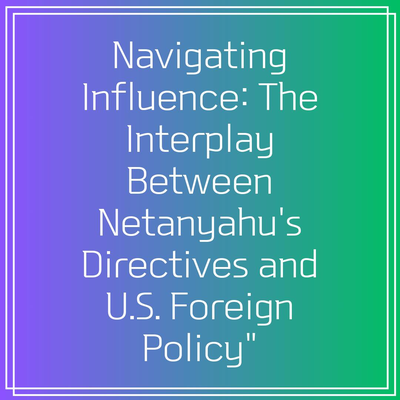
The Dynamics of Netanyahu’s Commands and U.S. Compliance
In recent months, the relationship between Israel, under Prime Minister Benjamin Netanyahu, and the United States has been characterized by a complex interplay of authority and allegiance. This blog explores how Netanyahu’s directives are perceived and responded to by U.S. leadership, illustrating the delicate balance of influence within the realm of international relations.
The recent increase in military tensions in the region has placed Netanyahu at the forefront of making critical decisions that demand immediate action. In this context, Netanyahu’s commands are not merely national directives; they are calls for international compliance. Reports indicate that in line with these commands, the U.S. has been largely supportive, often echoing Israel’s assertive stance in global forums.
For instance, during a critical juncture in conflict resolution talks, Netanyahu’s administration called for increased sanctions against perceived aggressors in the region, which the Biden administration promptly supported. This response illustrates a pattern where Netanyahu commands and the U.S. follows suit, reinforcing the alliance between the two nations.
The implications of this dynamic extend far beyond immediate military concerns. The U.S. follows Israel’s lead on various fronts, including economic assistance packages and legislative measures aimed at supporting Israel’s security framework. This reliance on Israel’s military directives highlights the extent to which American foreign policy is intertwined with Israeli political agendas.
Furthermore, this alignment has ignited discussions about the ethical dimensions of such close coordination. Critics argue that U.S. adherence to Netanyahu’s commands may undermine its ability to act as a neutral mediator in the ongoing Israeli-Palestinian conflict. By aligning too closely with Israel’s military ambitions, U.S. officials risk alienating Arab nations and perpetuating cycles of violence.
As Netanyahu continues to navigate the tumultuous waters of regional politics, the expectations for U.S. compliance remain integral to his administration’s strategy. Whether it involves military action, diplomatic maneuvers, or humanitarian considerations, the inherent trust between these two nations plays a pivotal role in shaping outcomes.
This relationship is further complicated by domestic political pressures within the U.S. Congress, where bipartisan support for Israel is consistently strong. The influence of pro-Israel lobby groups ensures that Netanyahu’s commands resonate throughout American politics, perpetuating a cycle where U.S. compliance with Israeli policies seems inevitable.
In conclusion, the relationship between Netanyahu’s commands and U.S. responses underscores a significant aspect of international relations, highlighting both the strategic partnership and the challenges it introduces. As the landscape of global politics continues to evolve, it remains crucial to observe how this dynamic will shape not only Israeli policy but also broader U.S. foreign policy objectives. The expectation for U.S. alignment with Israeli directives is likely to continue, making this a key aspect of any analysis pertaining to Middle Eastern geopolitics.


